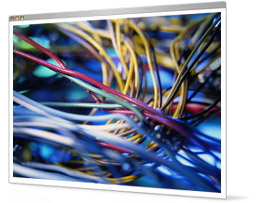My UPD8
You need to login before you download the free activities. You can register here.
- The Centre for Science Education
- The Association for Science Education
- Partners
- Part of ASE online
Wireless

Type: Activity
Learning Strategy: Role play
Topic: Electromagnetic radiation
Over a hundred years ago, Tesla experimented with long-range wireless energy transfer, but his attempts failed when he ran out of money. Now scientists aim to succeed where Tesla failed. They plan to use resonance to transfer energy from the mains to electrical devices without wires. In this activity, students compete to get funding for 'Wireless' by planning and presenting pitches for sponsorship to wealthy entrepreneurs, as in the TV programme 'Dragons Den'.
14-16 How Science Works:
• 4a: the use of contemporary scientific and technological developments and their benefits, drawbacks and risks
Published: 25th November 2006
Reviews & Comments: 3
Learning objectives
Students will:
• Reinforce their knowledge of energy transfer by electromagnetic radiation
• Evaluate the benefits and risks of 'Wireless'
• Develop their thinking and communication skills by pitching 'Wireless' to potential sponsors
Try the activity
Please login to download activities
Curriculum link
14 – 16 How science works• 4a: the use of contemporary scientific and technological developments and their benefits, drawbacks and risks
14 – 16 Energy, electricity and radiations
• 7b electrical power is readily transferred and controlled, and can be used in a range of different situations
• 7c radiations, including ionising radiations, can transfer energy
GCSE SPECIFICATIONS
AQA Core Unit P1a, 13.2
AQA Core Unit P1b, 13.5
Edexel Core P1b 11.7 and 11.19
C21 Core P2.1.2 and P2.1.4
C21 Additional P6.1.1 and P6.3
SEE DOWNLOADABLE TEACHERS GUIDE FOR MORE DETAILS
Running the activity
Display page 1, which introduces the topic and outlines the task. Then display page 2, which presents the scientific background.
Then divide the class into small groups. All but one group needs a copy of page 3. This guides students in planning their presentations to a panel of judges (the 'dragons') for financial backing.
Give one group a copy of page 4. This guides in the 'dragons' in their task - planning questions and deciding which group to invest in. If they struggle to think of questions, these ideas might help:
• Will it be useful in places with unreliable electricity supplies?
• Is it energy efficient?
• How long will it take to develop?
• Why use a 6.4 MHz wave?
• Has anyone tried to develop wireless before?
You could also ask the dragons to prepare cards or a table on which to score the presenters' performance in key areas, for example: the quality of their science explanation; their identification of potential purchasers and the quality of their presentation.
Then get each group to present their pitch to the 'dragons'. The dragons will ask questions of each group. Finally, ask the dragons to decide who gets their money – and to tell the rest of the class why. To encourage all groups to listen carefully to the presentations, you might like them to score the other groups in key areas, too, and have a class vote on who they think the dragons should invest in.
To maximise learning in How science works, finish the task by getting students to briefly state the benefits, drawbacks and risks of wireless.
Web links
News links
- BBC Dragons Den
- Dragons' Den is a series where entrepreneurs pitch their ideas to secure investment finance from our dragons - elite business entrepreneurs.
- BBC news
- The news story: the tangle of cables and plugs needed to recharge today's electronic gadgets could soon be a thing of the past.
- BBC news
- Information about another wireless re-charging device – Splashpad.
You could soon be saying goodbye to having several different chargers for all your handheld gadgets like your mobile phone or MP3 player. - Wikipedia
- Background information on electromagnetic radiation for teachers and more able students.
Reviews & Comments
Write your online review to share your feedback and classroom tips with other teachers. How well does it work, how engaging is it, how did you use it, and how could it be improved?
science
Nov 1st, 2010

was very helpful the pupils enjoyed it
Reviewer: Bola Akanho
Wireless review
May 21st, 2008

provoked some interesting discussion with my more able group
Reviewer: Julie Brough
Wireless
Jan 27th, 2007

Used activity to stimulate applied science students - worked well
Reviewer: Tim Kilbey

200 lessons and assessments from as little as £4.95